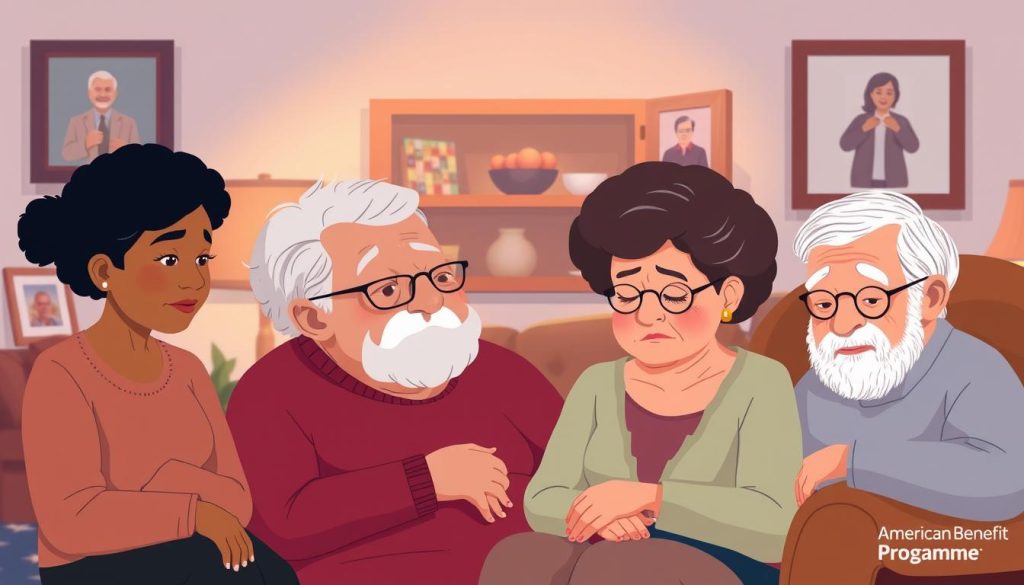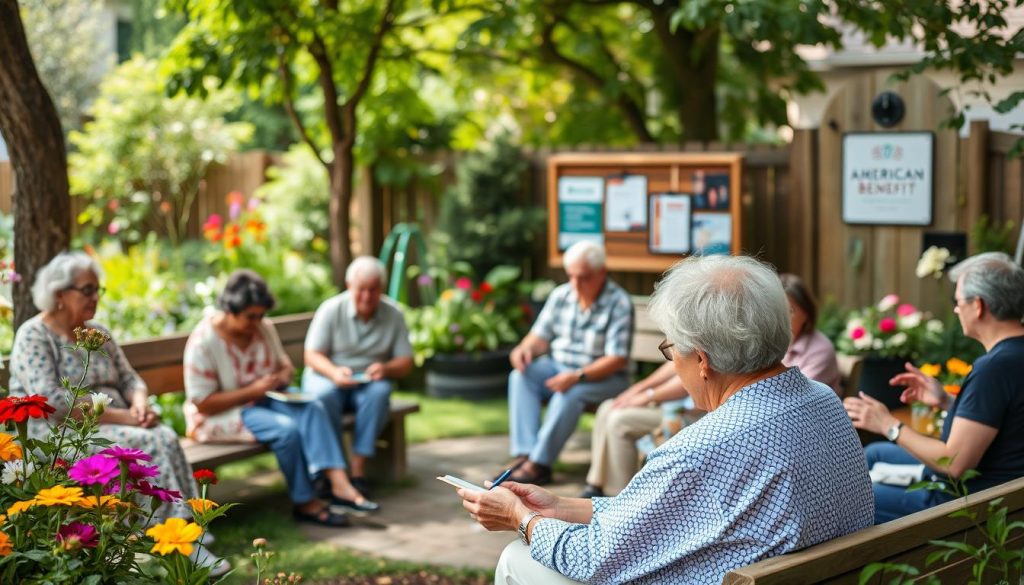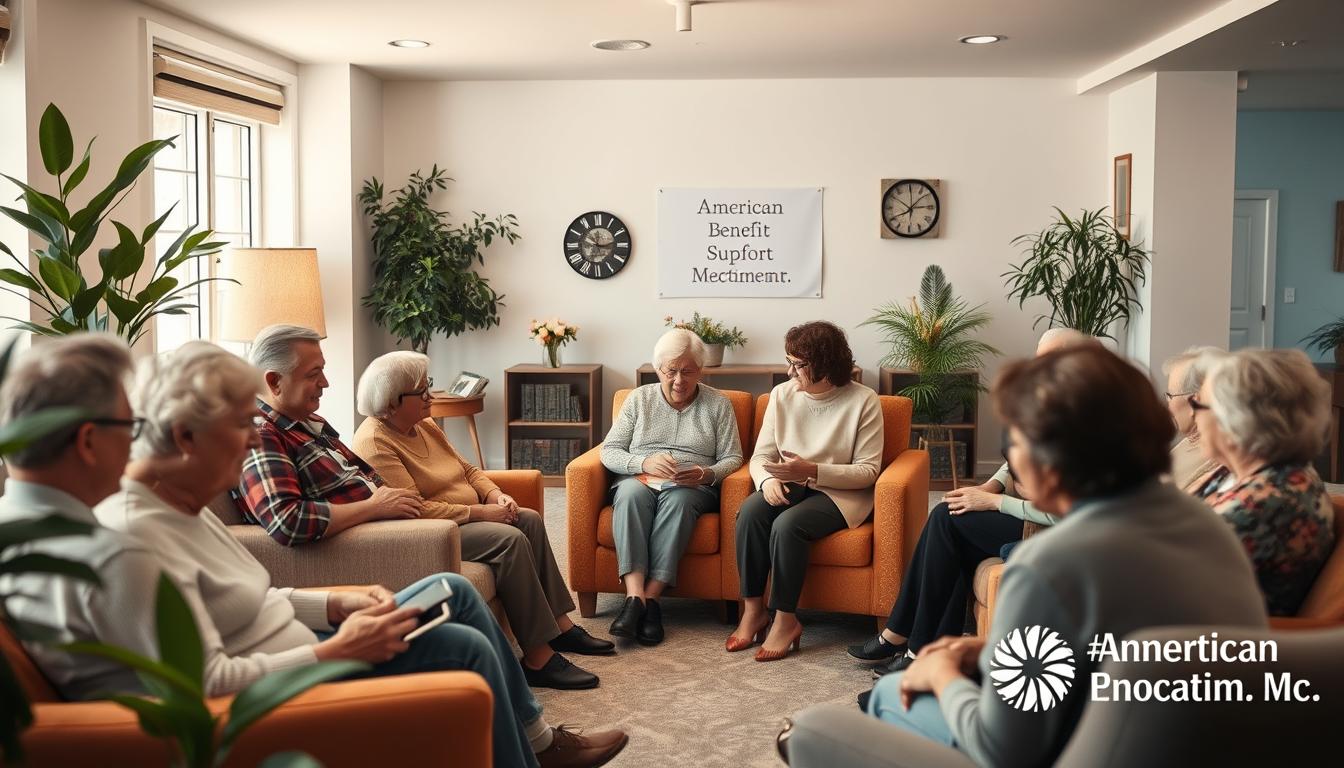Have you thought about mental health in elderly care talks? As more older adults join our society, we need to grasp mental health support for seniors. This guide provides insights and strategies for their emotional well-being. It offers information for caregivers and families. They can learn how to care for elderly mental health. Addressing mental wellness is crucial as many seniors struggle with depression, anxiety, and loneliness12.These issues can greatly affect their health and happiness.
Key Takeaways
- This guide highlights the essential aspects of mental health support for seniors.
- Understanding the impact of social isolation on elderly mental health is crucial.
- A comprehensive approach to elderly mental health care includes interdisciplinary strategies.
- Accessing resources like the Senior Living Communities Toolkit can enhance mental wellness.
- Regular screening for mental health disorders is key to early intervention.
Understanding the Mental Health Needs of Seniors
Mental health is very important for seniors’ well-being. Knowing how to help seniors mentally is key to their happiness. As they get older, seniors face many challenges. These can hurt their emotional well-being. Things like feeling alone, being sick a lot, and losing friends can make life hard. Helping them deal with these issues improves their mental health care.
Importance of Mental Well-being in Aging
Mental well-being is crucial as we get older. It helps both our mind and body stay healthy. Supporting mental health for seniors can reduce depression. Studies show one in four seniors faces mental health problems. This shows we need to focus on helping them. With lots of people turning 65 each day, we must provide good mental health care.
Statistics on Mental Health Among Older Adults
Looking at numbers helps us understand what seniors need. Around 20% of those over 50 had a mental health issue last year3. About 14% faced a mental illness. Only 3% had a serious mental illness (SMI)3. Sadly, less than 40% of older adults with these problems get help3. Being very lonely can also make their physical health worse. This can lead to big health problems4.
Barriers to Accessing Senior Mental Health Services
Older adults face many hurdles when trying to get mental health help. They deal with stigma, don’t know about help available, and often can’t afford it. These barriers make it hard for them to get the support they need.
Common Challenges Faced by Older Adults
A lot of seniors can’t easily get mental health care. Over 20% of those 60 or older have mental or brain issues. But less than half get the help they need5. Also, 18.4 percent of people 65 or older felt depressed recently6. Many feel lonely, which makes depression and anxiety worse7. Problems with moving around and getting places add to the struggle.
Strategies to Overcome Access Barriers
There are ways to help seniors get better access to mental health care. Programs that tell them about mental health services are key. Having teams that include their regular doctors provide mental health care helps too7. Offering rides can make it easier for them to go to appointments. Teaching families about mental health resources also aids seniors. Plus, using telehealth lets them talk to a therapist from home.
Mental Health Support for Seniors
Older adults face many challenges. It’s key they get mental health support for seniors. This support meets their special needs. It helps them stay well.
Types of Support Available
There are many senior mental health services to help seniors live better. They include:
- Psychotherapy, which helps older adults navigate emotional difficulties.
- Support groups that foster connection and understanding among peers.
- Counseling services to address life transitions and mental health challenges.
- Medication management to ensure that any prescribed treatments are monitored effectively.
Programs like IMPACT and Healthy IDEAS help a lot. They use community-based activities. But staying connected is hard when feeling isolated. So, linking seniors with services is key8.
Key Mental Health Services for Seniors
Special therapy is one of the key mental health services for seniors. CBT helps with harmful thinking patterns. Combined care blends physical and mental health help. The DOEA connects seniors with these important services89.
There are other good programs like PEARLS and Powerful Tools for Caregivers. They help seniors join in community support. This makes them stronger and more stable. It’s vital for seniors and families to check these out. They make a big difference in elderly mental health care.
| Type of Support | Description |
|---|---|
| Psychotherapy | Individualized therapy focusing on emotional and psychological issues. |
| Support Groups | A platform for shared experiences and communal healing. |
| Counseling Services | Guidance through life transitions and mental wellness challenges. |
| Medication Management | Monitoring and adjusting medications for optimal mental health. |
Recognizing Signs of Mental Health Issues in Seniors
It’s important to spot mental health signs in seniors early. Older adults may show mental health issues differently. Watch for less social interaction, eating changes, and confusion. About 20% of those over 50 face mental health problems10. Depression isn’t a normal part of getting older. It often comes from loss and ongoing health issues. This impacts many older people11. Spotting these issues is hard sometimes. The signs can look like normal aging or sickness11.
Common Symptoms of Mental Health Disorders
Seniors might show many mental health signs, including:
- Persistent sadness or depressed mood
- Anxiety and feelings of fear
- Increased irritability
- Loss of interest in previously enjoyed activities
- Changes in personal hygiene
- Substance misuse
- Sleep disturbances
- Feelings of despair, worthlessness, or guilt
Seniors make up 12% of people but 18% of suicides10. This shows they’re at high risk for mental health issues. Factors like bad diet and not moving enough can also up the risk12.
Differences Between Aging and Mental Illness Symptoms
It can be tough to tell normal aging from mental illness signs. Memory loss is normal with age. But big memory trouble, mood swings, or pulling away from friends can mean mental health trouble12. It’s key to catch these signs early for the right help. Some signs of conditions like dementia include:
| Signs of Dementia | Symptoms |
|---|---|
| Difficulty with everyday tasks | Struggling to manage daily functions |
| Repetitive questions or stories | Forgetting recent conversations |
| Confusion about time and place | Losing track of time or the right setting |
| Neglecting grooming | Failure to maintain personal hygiene |
| Loss of interest in activities | Disinterest in previously enjoyed events |

Knowing these details helps make mental health care better for seniors12.
Promoting Emotional Wellbeing for Older Adults
Activities that boost emotional health are vital for older adults. Joining in art therapy, gardening, or exercise groups helps a lot. They can lower feelings of sadness and worry. This makes older adults feel connected, fighting off loneliness13
Activities to Enhance Emotional Health
Many programs keep seniors active and happy. They can choose from:
- Art Therapy: It’s good for mental health and sparks creativity.
- Group Exercises: Good for the body and helps people meet friends.
- Gardening: It makes a daily routine and gives a goal to reach.
- Volunteering: It connects seniors with others, making them feel they belong.
These helpful activities prevent older adults from feeling lonely14.
The Role of Social Connections in Emotional Well-being
Staying connected with others is key for older adults’ emotional health. It protects them from mental health problems. Being close to family, friends, and the community offers support. It lowers loneliness and sadness. Social activities like outings and online chats are important. They improve overall happiness1314.
Effective Therapy Approaches for Aging Individuals
As more older adults face mental health issues, finding the right therapy is key. Such therapy helps seniors tackle mental challenges and improve their lives. Cognitive behavioral therapy (CBT) for them is very helpful and boosts mental health.
Cognitive Behavioral Therapy (CBT) for Seniors
CBT is great for seniors dealing with anxiety and depression. It changes negative thoughts and gives coping skills. About 20-22% of older adults have a mental disorder, so CBT15 is important. It considers their life experiences, offering support.
Benefits of Group Therapy Sessions
Group therapy helps seniors feel connected and less alone. It’s a big help for about a quarter of them16. These sessions offer friendship and understanding. They make seniors feel less isolated by meeting others like them. This shows how group therapy is good for their mental health.
Geriatric Mental Health Resources
Older adults need good mental health resources to feel better. There are special supports just for them. These help with their unique challenges, like feeling alone or sad.
Community Programs and Support Services
Many community programs and support services care about older people’s mental health. Local centers have programs just for them. They offer talking help, learning, and groups to join.
For example, they help with feeling lonely, a big problem for many older people. These services can be at the center or the person’s home. In Florida, there are many mental health programs for older adults17. They include help for families, checking medicines, and fun activities18.
Online Resources for Information and Support
There’s also a lot of help online. Websites like SAMHSA and Novant Health give important info. They make it easier for older people to find what they need.
There’s even a hotline for help anytime, offered by Novant Health. Online groups and meetings are great for making friends18.
Using local and online help gives older people full support. This way, they can stay happy and enjoy life171819.
Senior Mental Wellness Programs
Senior mental wellness programs help older adults stay mentally healthy. About 14% of people aged 60 and older have mental health issues. These programs use good practices to help these seniors20. Lifescape’s program, for example, uses special tools to spot loneliness and depression. This way, they can give each older person the right kind of help21.
Overview of Evidence-Based Practices
Good practices in these programs really make a difference. They keep older people active and teach them important things. Techniques like talking therapy help give emotional support that fits their needs. These programs also suggest fun activities and making friends to fight off loneliness20.
Integrating Mental and Physical Health Care
It’s important to look after both mental and physical health. Doing physical activities, eating well, and getting enough sleep can make mental health better. Lifescape combines these with therapy. This helps both the mind and body, which is good for overall health21. Such care helps older adults stay strong and mentally healthy during big changes in life.

Seeking Help: How Seniors Can Access Support
It’s important for seniors to get help for mental health issues like anxiety and depression. They can find help locally or online, made just for them. Many places like hospitals and senior centers offer this help. Now, with telehealth, getting help from home is easy. This makes finding local and online therapy options simple.
Finding Local and Online Therapy Options
About 20% of people over 55 struggle with depression. This shows how key it is for seniors to seek help22. They can find help that understands what older people need. Having friends and emotional support can help keep mental illness away22. It shows why it’s so important to have different ways to get help.
The Role of Family and Caregivers in Seeking Support
Family and caregivers play a big part in this. They notice when seniors are not feeling well. They help them get to therapy and support them to ask for the help they need. This role of family and caregivers in seeking support is crucial. Up to 25% of those 65 and older have mental health conditions like anxiety or depression23. Teaching caregivers how to talk about mental health and what help is out there makes them even more supportive.
Conclusion
Seniors’ mental health is key to their happiness and life quality. By 2050, we’ll have two billion elderly people. They face mental health issues, affecting more than 20% of those over 55. These problems can make daily life hard and raise health care costs24. It’s crucial to tackle these challenges to better their mental health care access.
Being part of a community helps seniors feel better emotionally. Most seniors say visits from loved ones keep them mentally healthy. Also, 77% say being more social helps too25. When therapy, family, and community work together, it fights stigma. This encourages them to get the mental health care they need.
Understanding what seniors need for their mental health is important. We must make them feel valued and cared for. It’s urgent to improve policies and help that focus on their mental health and loneliness. This way, older adults can have a happy and emotionally healthy life2425.
Source Links
- Resources for Older Adults
- Mental Health Services for Seniors | Members
- State TA: Supporting the Mental Health Needs of Older Adults
- What to Know About Mental Health in Older Adults
- Barriers and facilitators of older adults for professional mental health help-seeking: a systematic review
- Mental Health and Aging: The Role of Primary Care in Overcoming Barriers to Treatment – MedCity News
- Mental Wellness – DOEA
- Mental Health Hotlines for Seniors | 866-903-3787
- These 10 Signs May Indicate Mental Illness in the Elderly | Bella Vista San Diego, CA
- Depression in Seniors: Signs, Causes And Treatment – Lakeside Behavioral Health System
- Early Signs of Mental Health Struggles and Illness in Seniors – Bethesda Health Group
- Forbes EQ BrandVoice: Six Recommendations To Promote Emotional Wellness In Older Adults Using Design Thinking
- Promoting positive mental wellbeing for older people
- Helpful approaches to older people experiencing mental health problems: a critical review of models of mental health care
- Mental health of older adults
- Geriatric Mental Health Care | HCA Florida
- Geriatric Mental Health Programs| Novant Health
- Resources – National Coalition on Mental Health and Aging
- Promoting Mental Health Wellness in Seniors – Spring Mountain Treatment Center
- Senior Mental Health Program – Helping older adults obtain appropriate care
- How Do You Talk to Seniors About Mental Health?
- 7 Ways Older Adults Can Manage Their Mental Health
- Mental health and wellbeing of older people: opportunities and challenges
- Mental Health Awareness for Older Adults: Comprehensive Support and Strategies

Leave a Reply